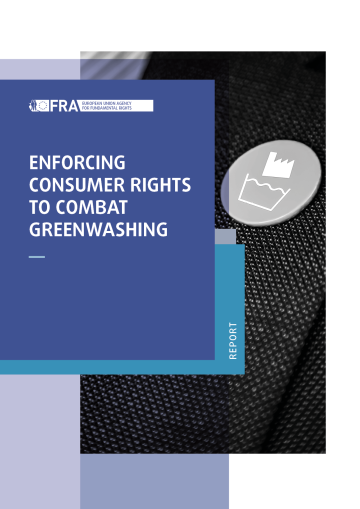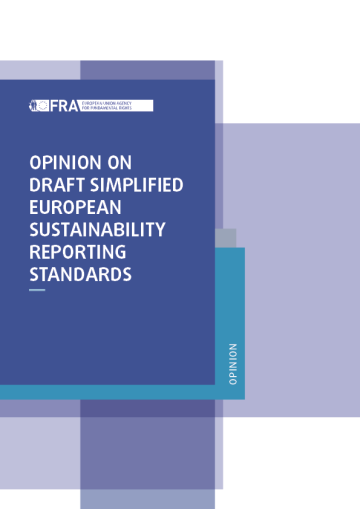
Enforcing consumer rights to combat greenwashing
Search inside this publication
-
Key findings
- A human rights approach to environmental protection empowers consumers
- Environmental protection – the advantages and limitations of consumer laws
- Adopting more precise legal frameworks to ensure uniform interpretation
- Ensuring effective enforcement of rights
- Enhancing cohesion of the supervisory system
- Representative action and procedural rights of civil society organisations
- Significance of awareness-raising
- Introduction
-
1. Consumers’ right to reliable information and environmental impact
- 1.1 Combating greenwashing as a misleading commercial practice
- 1.2. Carbon-neutral and carbon ‘offsetting’ claims
- 1.3. Combating greenwashing through advertising regulations
- 1.4. Labels and certification
- 1.5. Aarhus Convention provisions relevant to consumer protection
- 1.6. Due diligence and reporting obligations
- 2. Legal requirements for enforcing collective consumer and environmental rights
-
3. Ways forward
- 3.1. Ensuring effective enforcement of rights
- 3.2. Enhancing cohesion of the supervisory system
- 3.3. Representative action and procedural rights of civil society organisations
- 3.4. Training and awareness-raising
- 3.5. Guidance for business
- 3.6. Incorporating sustainability into consumer protection policy
- 3.7 Due diligence and reporting
- About this publication
Human rights and the environment are intrinsically linked: a clean, healthy and sustainable environment is essential to the enjoyment of a range of human rights. Under international human rights treaties and the EU Charter of Fundamental Rights, governments have an obligation to protect, respect, promote and fulfil all human rights. This includes an obligation to prevent foreseeable harm to rights, such as that presented by climate change. There is growing recognition of these links in international soft law and in regional human rights frameworks.
The key messages on human rights and climate change of the Office of the United Nations High Commissioner for Human Rights highlight the human rights obligations of states and the responsibilities of other actors, including businesses, with respect to climate change-related agreements, policies and actions.
Protecting consumer rights and protecting the environment can align in several ways, since both aim to promote sustainable practices and responsible consumption by addressing green marketing, encouraging sustainable consumption and consumer education, and combating ‘greenwashing’.
Greenwashing refers to the practice of conveying false or misleading information about the environmental friendliness of a company’s products. It involves using deceptive advertising or marketing tactics to convince the public that the company’s products, goals and policies are environmentally sound. It can be found in advertising, sponsorship and public messaging in the media, including on social media. Examples of greenwashing can range from simply changing the name or label of a product to make it seem more natural, even if it contains harmful chemicals, to launching elaborate and expensive campaigns that portray highly polluting companies as being eco-friendly.
In today’s dynamic business landscape, companies are faced with growing demands from consumers, governments and investors to embrace sustainability and address climate change. Regrettably, however, some companies seek to capitalise on the increasing demand for environmentally friendly products and use greenwashing to project an image of social responsibility without actually changing their operational practices, thus diverting public attention from the negative impact these may have. Greenwashing therefore results in a range of potential harms to consumers as rights holders, by deceiving and disempowering them through encouraging economic choices that do not in fact advance sustainability goals.
Recognising the potential role of consumers in advancing responses to climate change has led the EU and national legislators to connect consumer and environmental protection in EU legislative and policy initiatives.
The European Green Deal emphasises the importance of empowering consumers to make informed decisions. The 2022 proposal on empowering consumers for the green transition, adopted in February 2024, aims to strengthen consumer rights, in particular by revising the unfair commercial practices directive (UCPD), in order to expressly address greenwashing practices. In addition, a 2023 proposal for a new green claims directive provides more specific rules on substantiation and communication of environmental claims.
The report examines legal frameworks in selected EU Member States (Austria, Belgium, Bulgaria, Denmark, France, Germany, Italy, the Netherlands, Poland and Portugal) to assess whether they ensure consumers’ access to accurate information about the environmental effects of products and services, and whether they hold companies accountable for making misleading green claims (greenwashing). This report presents examples of the application of existing legislation, where available, and points to shortcomings or inconsistencies in its implementation. In addition, the report identifies areas for improvement and proposes solutions to address the gaps in effective protection (see Chapter 3 on ways forward). The findings are relevant for EU and national policymakers, and also for enforcement bodies when implementing provisions targeting misleading environmental claims.
Adopting a human rights approach to environmental protection and corporate climate accountability requires a focus on the obligations of governments and the responsibilities of large companies, and also on empowering consumers as rights holders. It can help promote sustainable consumption, as it encourages consumers to make choices that are good for both themselves and the environment. Tackling greenwashing is an example of an issue for which human rights, consumer rights and climate goals align.
Furthermore, consumer empowerment depends on access to information and effective access to justice to ensure the enforcement of rights. As demonstrated by the European Union Agency for Fundamental Rights (FRA)’s prior research on business and human rights, the presence of procedural obstacles frequently prevents individuals from asserting their rights against corporations, thereby rendering those rights ineffectual. A rights-based approach to environmental protection also aims to increase access to justice not only for individual victims but also for communities. This includes allowing non-governmental organisations (NGOs) to represent communities and protect the environment in the public interest. In July 2022, the United Nations General Assembly adopted a resolution declaring that everyone has the right to a healthy environment. Allowing NGOs to challenge greenwashing without having to prove individual harm is therefore consistent with emerging international law and acknowledges the right of communities to actively participate in shaping policies related to climate change.
Environmental protection can be improved through more effective protection of consumer rights. Incorporating sustainability into consumer protection policy can promote economic and social development and environmental goals.
Consumer protection laws can empower consumers to make informed decisions and hold businesses accountable for the negative environmental impacts that may result from misleading claims, but their potential may be hindered by lack of awareness and procedural obstacles.
The research suggests that consumer law is more effective than administrative environmental law in addressing greenwashing. This is because consumer law is specifically designed to protect consumers from deceptive advertising, whereas administrative environmental law focuses primarily on regulating environmental impact. Consumer law offers legal protection and advantageous procedural rules to consumers who have been misled by greenwashing claims, and it can result in penalties for companies involved in such practices. In contrast, environmental law may not have the same extent of enforcement measures, and experts did not identify the legal possibility to tackle greenwashing through traditional environmental laws in most countries covered by the research. Furthermore, laws on access to environmental information are primarily directed towards public authorities and not corporations; therefore, their application is limited.
However, the study shows that the existing legal framework on consumer protection in several Member States addresses environmental harm only to a limited extent. Consumer protection laws should explicitly address the environmental impact of products and services in order to improve their effectiveness.
The research found that relevant legislation applicable to greenwashing in Member States covered by this study is the result of the EU acquis, in particular relating to unfair commercial practices.
The broad definition of commercial practices under the UCPD has made it possible to address greenwashing practices in several Member States, prior to the existence of EU and national legislation explicitly providing definitions of environmental claims.
The research found significant discrepancies between Member States in the application of the provisions on unfair commercial practices to greenwashing, not only with respect to the interpretation of specific terms but also as regards the existence of initiatives to challenge greenwashing at all. In some of the Member States, civil society has initiated a significant number of legal actions, while in others few if any cases have been brought based on these provisions.
Moreover, different approaches have emerged as to how the responsibility for the potentially misleading communication is assigned: courts in some Member States require companies to provide evidence for all aspects of environmental claims, while others find that consumers have a responsibility to research information and seek alternative sources before claiming to have been deceived.
Experts consulted in this research claimed that it is necessary to have more precise legislation at the EU level expressly addressing greenwashing and to provide clear criteria to be met by companies when making any kind of green statement.
The new EU legislative initiatives relating to green claims aim to address these gaps, establishing explicit rules on the admissibility and substantiation of sustainable performance claims.
In addition, the research shows that these proposals have triggered more detailed and targeted legislation in Member States or have already been invoked in successful court litigation. Thus, initiatives at the EU level can drive legislative reforms in Member States and help strengthen laws against greenwashing, even before final adoption.
The enforcement of consumer rights to combat greenwashing may be positively or negatively influenced by a variety of factors, such as dissuasiveness of sanctions, burden of proof and conditions for civil-society representation.
Judicial and administrative sanctions can foster prevention, namely by serving as a deterrent against unlawful or abusive behaviour, and redress, namely by providing public and official recognition of the wrongdoing and conveying the message that justice is being served.
Sanctions, such as fines, can be an effective tool to combat greenwashing if they are sufficiently severe to be dissuasive. These can be either administrative fines or damages ordered by courts. Administrative fines are fixed by law, and according to experts are too small to have any significant dissuasive effect and effectively deter large corporations, to which they are typically directed, considering large corporations’ substantial financial resources and potential costs of misleading marketing campaigns.
This issue has been addressed in targeted legislation adopted in some countries, where fines for greenwashing can amount to up to 80 % of the cost of the misleading promotional campaign.
The EU plans to introduce penalties for greenwashing in the proposed green claims directive, including fines, confiscation of revenues and temporary exclusion from public procurement (Article 17). The proposal highlights in recital 64 of the preamble that, ‘when setting penalties and measures for infringements, the Member States should foresee that, based on the gravity of the infringement, the level of fines should effectively deprive the non-compliant trader from the economic benefit derived from using the misleading or unsubstantiated explicit environmental claim or non-compliant environmental labelling scheme, including in cases of repeated infringement’.
The research finds that the rules concerning burden of proof can impose an excessive burden on consumers pursuing claims.
According to the UCPD, it is for national law to determine the rules regarding burden of proof, but courts and administrative authorities should have the power to request evidence from businesses to support their claims. In most EU Member States studied, the burden of proof usually rests on the company to prove that their information is correct and complete. However, in some Member States the burden of proof falls on the plaintiff if the lawsuit is based on the seller’s contractual obligations. In all Member States, when damages are claimed, the consumer must prove a link between the unlawful act (such as misleading advertising) and the harm.
As regards disclosure, the corporate sustainability reporting directive (CSRD) introduced significant advancements in the regulations governing the disclosure of social and environmental information by companies. It remains to be seen how this directive will improve access to environmental information for evidence purposes.
Disclosure of information is closely linked to access to information. The EU and its 27 Member States are all parties to the Aarhus Convention, which explicitly guarantees the right to access to environmental information held by public authorities. The findings of this research show, however, that in certain cases this access can be limited by law, for example on grounds relating to protected data, pending legal proceedings, intellectual property rights violations and public security. In addition, third-party information of commercial value may be withheld if it could harm a company’s competitive position. Experts consulted for this research expressed concern that these exceptions are sometimes applied too broadly, blocking access to information, contrary to the spirit and purpose of the Aarhus Convention. Furthermore, the review process for challenging these denials is sometimes ineffective and slow, while the relevance of the information may diminish over time.
National authorities in individual countries are responsible for the enforcement of EU consumer protection laws. According to the UCPD, a Member State can decide whether these provisions will be enforced through judicial or administrative proceedings, and whether prior use of other avenues, such as codes of conduct, should be required. The current proliferation of regulations at the national and EU levels, while helpful, makes the legal landscape more complex and fragmented, rendering it potentially less effective or even counterproductive.
The research findings and the experts consulted for this study point to the fragmentation of the current supervisory system regarding issues such as misleading commercial practices or access to environmental information. In addition to instances of shared competence by administrative and judicial bodies, a number of experts highlighted the existence of multiple national authorities responsible for overseeing various consumer rights. This may lead to confusion among consumers about the respective competencies of supervisory bodies.
Furthermore, in some Member States the authorities can refuse to take any action when an alleged infringement is reported, and in some Member States consumers cannot appeal their decisions.
Consumer and environmental protection associations play an important role in empowering rights holders and protecting environmental interests. They do this by promoting transparency and accuracy in environmental marketing, advocating for stronger consumer protection laws, filing complaints on behalf of consumers or in the public interest and raising awareness among consumers. Furthermore, civil-society organisations bring expert knowledge about environmental issues, which judges may not possess, especially in cases where companies use scientific terms to promote their products.
The 2020 representative actions directive (RAD) allows consumers in the EU to protect their collective interests through legal action brought by representative ‘qualified entities’. The RAD distinguishes between domestic and cross-border representative actions, with different criteria for each, and Member States have more flexibility in setting criteria for qualified entities in domestic actions.
The research confirms that the legal standing of NGOs in litigation relating to consumer and environmental rights varies across Member States, which can make judicial procedures against multinational corporations more difficult.
In some Member States, NGOs are allowed to sue even if their rights or legal interests are not affected by the acts or omissions in question, while in other Member States legal action brought by an NGO based on its statutory objectives, such as environmental protection, may be considered inadmissible in litigation based on consumer rights, owing to lack of legal standing for such claims.
Environmental organisations are often barred from pursuing legal action in consumer affairs, where legal standing is reserved for qualified consumer organisations. Furthermore, in certain Member States, only nationally recognised NGOs have legal standing to file a legal action, even though the defendant may be a multinational corporation and the alleged environmental concerns span multiple countries and have been raised throughout the EU.
Consumers who are aware of greenwashing practices are more likely to make informed decisions and avoid products that are not environmentally friendly. This can lead to declines in sales and customer loyalty for companies that engage in greenwashing practices. In addition, consumers can alert market surveillance authorities and amplify the impact of awareness-raising campaigns, and also initiate litigation.
However, complaints and the decisions of administrative bodies are often not published, further hindering transparency and educational effect in this regard.
The research finds that raising awareness of greenwashing practices is primarily carried out by civil society organisations who often face significant resource constraints.
Raising awareness among consumers is essential to combat greenwashing practices and ensure that companies are held accountable for their environmental claims. In addition, Member States’ obligation to promote human rights includes ensuring that people are aware of their rights. Raising awareness is therefore another way to protect consumers and the environment through a human rights approach to climate protection.






